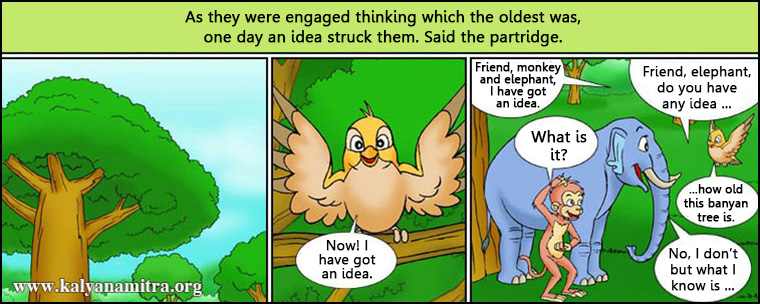Page 2
Tittira-Jataka
A partridge, a monkey and an elephant living together, decide to obey the senior. To prove seniority, each gives his earliest recollection.
Pictured by: PongPang
Coloured by: Pupay












Tittira-Jātaka
A Partridge, a Monkey and an Elephant Living Together, Decide to Obey the Senior. To Prove Seniority Each Gives His Earliest Recollection.
The Origin of the Story
For, when Millionaire Anatha-pindika had built his monastery and had sent word that it was finished, the Lord Buddha left Rajagaha and came to Vesali, setting out again on his journey after stopping at the latter place during his pleasure.
It was now that the disciples of the Six hurried on ahead and before quarters could be taken for the Elders, monopolized the whole of the available lodgings which they distributed among their superiors, their teachers and themselves. When the Elders came up later, they could find no quarters at all for the night. Even Sariputta’s disciples, for all their searching, could not find lodgings for the Elder. Being without a lodging, Venerable Sariputta passed the night at the foot of a tree near the Lord Buddha’s quarters, either walking up and down or sitting at the foot of a tree.
At early dawn, the Lord Buddha learnt the situation from the Venerable, at the close of which the Lord Buddha thought, ‘Even now, while I am still alive, the monks lack courtesy and subordination; what will they not do when I am dead and gone?’ And the thought filled Him with anxiety for the truth.
As soon as day had come, He had the assembly of the monks called together and asked them, saying, ‘Tell me, who deserves the best lodging, the best water and the best rice, monks?’
Some answered, ‘He who was a nobleman before he became a monk.’ Others said, ‘He who was originally a Brahmin or a man of means.’ Others severally said, ‘The man versed in the Rules of the Order; the man who can expound the Law; the men who have won the first, second, third or fourth stage of mystic ecstasy.’ Whilst others again said, ‘The man in the First, Second or Third Path of mental liberations or an Arahat; one who knows the Three Great Truths; one who has the Six Higher Knowledges.’
Monks, in my religion it is seniority which claims respect of word and deed, salutation and all due service; it is seniors who should enjoy the best lodging, the best water and the best rice. This is the true standard and therefore the senior monks ought to have these things.
And for their further instruction he said, ‘In times past, monks, even animals came to the conclusion that it was not proper for them to live without respect and subordination one to another or without the ordering of their common life; even these animals decided to find out which among them was the senior and then to show him all forms of reverence. So they looked into the matter and having found out which of them was the senior, they showed him all forms of reverence whereby they passed away at that life’s close to people heaven.’ And so saying, he told this story of the past.
The story of Jātaka -
The revealing of the identities -
What are learned from the story:
1. The elder deserve respect.
2. The acts of respect include recognition and veneration, marks of obeisance and homage, respect of word, etc.
3. The younger will in return receive counsels, words of advice, knowledge, etc. from the elder for living their lives correctly.
The End